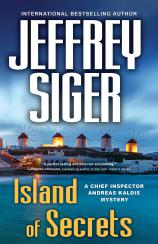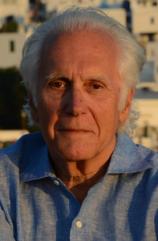Author Talk: April 11, 2019
When corruption lies deep beneath the surface, how can the truth come to light? This question lies at the heart of THE MYKONOS MOB, Jeffrey Siger’s 10th police procedural featuring Chief Inspector Andreas Kaldis and his Special Crimes unit. In this interview, Siger explains why he chose Greece as the setting for his mysteries, gives a shout-out to the authors who have most influenced his style of writing and approach to dialogue (while also naming the two literary legends to whom his work is most often compared), and reveals the hot-button issue that may become the foundation of the next installment in the series.
Question: When you made the decision to start a crime series, why did you choose Greece as the setting?
Jeffrey Siger: When I started writing about Andreas Kaldis with MURDER IN MYKONOS, I didn’t intend on creating a series. I thought I’d be writing a stand-alone novel telling the story of a Greek island I had come to know intimately over the course of several decades. I wanted to write about the people, culture and politics of Mykonos, and only settled upon the mystery format because it struck me as the best vehicle for exploring how a tourist island society might respond to a threat to its newfound economic glory.
Greece provides an inexhaustible source of material for the two central elements of this series: (1) a serious, modern-day issue that my characters must confront and overcome, and (2) a perspective on that issue to be found in the ancient past. There is no place on earth more closely linked to the ancient world than Greece --- it is the birthplace of the gods, the cradle of European civilization, the bridge between East and West. Spartan courage, Athenian democracy, Olympic achievement, Trojan intrigue --- all sprung from this wondrous land.
As for Greece’s place in the modern world: just look at a map, and you'll immediately realize how many of the greatest issues facing the modern world are centered in Greece’s Mediterranean neighborhood. I’d venture to say that no western country is closer to what challenges our planet today than Greece. It is a paradise for mystery writers….as more seem to be realizing every day.
Q: Every mystery writer has a number of favorite predecessors. Can you name two or three whose work was particularly influential in laying the groundwork for Inspector Kaldis and his resourceful policemen?
JS: That’s such a hard question for me to answer, because those I think of as having most influenced my style of writing are not commonly associated with the crime fiction genre. Cormac McCarthy is a favorite of mine on so many levels, as is Steinbeck, and I admire the pacing of Tom Clancy. But in my approach to dialogue, I think of myself as influenced more by the cadence of poets (Robert Frost, believe it or not) and the decisive rigor of playwrights (such as August Wilson).
I see Kaldis and his crew as having naturally evolved without any conscious input on my part. Having said that, my work is most often compared to that of Ed McBain and Donna Leon, two literary legends to whom I am deeply honored to be compared.
Q: One trademark of the Chief Inspector Kaldis series is the setting shifting from one Greek island to another from book to book. Aren't you in danger of running out of options at some point?
JS: In order to run out of Greek island locales --- not to mention the plethora of utterly intriguing mainland venues --- I’d have to live more than a thousand years…and that would be at a two-book-a-year pace!
Q: Another of your distinctive trademarks of this series is your use of a hot-button issue as the engine that drives the plot of each novel. In your previous book, AN AEGEAN APRIL, it was the mistreatment and exploitation of the immigrants who continue streaming into Greece year after year. In THE MYKONOS MOB, you explore the effects of the island’s ever-expanding popularity with the tourist trade upon the lives of its native occupants. Which issue might become the foundation of the next Chief Inspector Kaldis novel?
JS: So many things happening in our world call out for Kaldis to intervene, but at the moment there’s an idea percolating in my mind that has its hooks deeply into me. It’s a battle raging on an island close by Mykonos that has islanders seeking to preserve their agrarian ways pitted against those seeking to maximize tourism profits. It is a dilemma facing many of the world’s tourist paradises, but particularly so the Greek islands. And it can lead to murder. That's all I have to say about that for now. Stay tuned...
Q: Living half the year in Greece as you do, you have a very special perspective on the issues that most concern contemporary Greeks. Do you ever have a hankering to write a novel that features an American setting? And if so, in what section of the country would you like to have it set?
JS: In Greece, I'm blessed with contacts who give me inside perspectives on what goes on behind the scenes. That’s hard to replicate back in the USA. However, if I were to place a book in an American setting, I’d likely use the northwestern New Jersey farm community I call home when not in Greece. It has so much mood to offer, not the least of which is that generated from its modern history as the location where Friday the 13th was filmed…and several folks actually named their sons Jason in its honor!
Q: If Netflix or HBO was to come calling with a plan to develop an on-location film or miniseries based on one of the Kaldis novels, with which one would you suggest they commence? And in the unlikely event that you were consulted regarding the actors they ought to hire, play casting director for a moment.
JS: Funny you should mention that. Let’s just say that I don’t count my film deals --- or leading actors --- until they’re hatched. However, and hypothetically speaking, I’d say the place to start is with the first in the series, MURDER IN MYKONOS, because it plumbs the spirit of Greek islands in general, and Mykonos in particular, while establishing the personal integrity of Andreas Kaldis that carries forward throughout the series. As for lead actors, I’m so bad at that, but others have suggested Clive Owen or Bradley Cooper.




